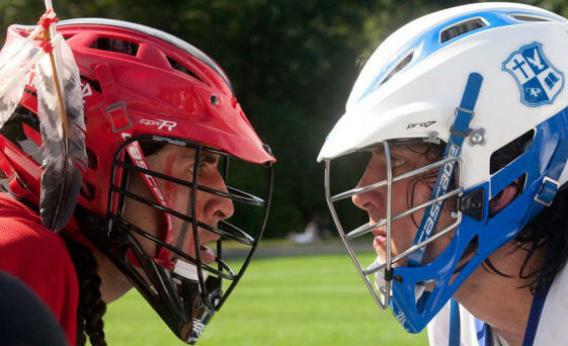The most famous game of lacrosse took place on June 4, 1763 at Fort Michilimackinac, in what is now Northern Michigan. British forces had recently taken command of the fort, one of the spoils of their victory in the French and Indian War. June 4 was King George III’s birthday, and to mark the occasion, a group of Sauk and Ojibwa Indians offered to stage an exhibition of the game they called baggatiway. By all accounts, the British garrison was captivated by the anarchic, fast-paced play—at least until the Indians dropped their sticks, took up arms, butchered the spectators, and captured the fort. Turned out they were still partial to the French.
Crooked Arrows, the new feature film from director Steve Rash, tells the story of another group of Native American lacrosse players at odds with their white neighbors. The stakes here are a bit lower, though, and the only real violence is perpetrated against the fundamentals of good filmmaking. Working with a manifestly small budget, Rash has set out to bestow a Mighty Ducks-style sports movie on this proud and ancient game. The result is an amateurish, highly predictable film overstuffed with Native American mumbo jumbo. And yet such is the durability of the sports movie formula—and such is the good-natured pluck of this movie—that I found myself considering a fist-pump when, during the Arrows’ improbable run through the playoffs, the weakest of the team’s midfielders (his spirit animal is the meek but crafty squirrel) scored a pivotal goal. I didn’t actually pump my fist, as I was still recovering from a training montage set to Chumbawumba’s “Tubthumping.” But I felt a twinge.
Like The Mighty Ducks, Crooked Arrows centers on the plight of a reluctant coach. Joe Logan (Brandon Routh, who starred in Superman Returns) is a Sunaquat Indian who manages the tribe’s casino in upstate New York. A smarmy investor has approached Logan about expanding the casino operations, promising the (fictional) tribe untold riches if it will devote reservation land to a vast expansion. (Ask the Connecticut Pequots about whether that’s a good idea.) Joe, who privileges money over tradition (we know this because the vanity plate on his Audi reads WAMPUM), petitions the Sunaquat tribal council to approve the expansion. The council agrees, but with one condition: that Joe first “examine his spirit,” in a manner to be chosen by Joe’s traditionalist father (Gil Birmingham), who fears his son does not have the Sunaquats’ best interests at heart. Naturally, the spiritual challenge Joe’s father devises is coaching the tribe’s lacrosse team, a rag-tag band of misfits who are routinely and humiliatingly dispatched by the rich, white prep school teams that now dominate the game the Sunaquats invented. (Well, technically they didn’t invent it, it was a gift from the Creator Spirit—but it’s still annoying that the preppies are so damn good.)
Logan accepts his spirit quest reluctantly, but soon enough the loveable Arrows have won him over with their goofball antics. There’s Chewy (Cree Cathers), the corpulent joker; Maug (Aaron Printup), a taciturn giant who insists on playing with an old-fashioned stick made of hickory; and the team captain, Silverfoot (Tyler Hill), a double-braided braggart with a heart of gold. In one of the film’s few surprising twists, it turns out that Logan attended Coventry—the most dominant and arrogant of the local prep schools—where he was a star on the lacrosse field but a social outcast, a poor Indian in a school for rich white kids. The Arrows have untapped talent, the coach has a score to settle. Cue the Chumbawumba.
The transformation of the Crooked Arrows from a perennial doormat into a preppy-trouncing powerhouse is the silliest but also the most enjoyable stretch of the movie. No cliché of Native American life goes unexplored. The players run through the forest, practicing their dodges on trees, as their ancestors did. They sprint up a craggy mountain where they commune with a tribal elder who tells them that even crooked arrows can find their way, if they stay true to their path (whatever that means). They visit a sweat lodge, where each player has a vision of his spirit animal and receives an amulet bearing that creature’s likeness. And in my favorite turn, Coach Logan decides to translate the names of the team’s plays into Sunaquat, likening the effort to the work of the Navajo Code Talkers, who helped encrypt secret messages for the U.S. Marines during World War II. Alas for Logan, his command of Sunaquat is rusty after all those years at the casino: Attempting to describe a “V-cut,” he actually calls it a “vagina dodge,” to the adolescent glee of his players.
Needless to say, all of these efforts pay off, and the Crooked Arrows streak to a championship showdown with Coventry. (This despite the fact that team has only one substitute on the bench and an offense that clearly relies too heavily on the vagina dodge.) Will the upstart Indians carry the day? Will they restore honor to their native sport? Will a poorly CGI’d bald eagle representing the spirit of Logan’s dead mother hover meaningfully over the proceedings? The answers to all of these questions are never in doubt, but even so, you’d have to be a poor sport—or have lost an ancestor at Fort Michilimackinac—not to have some fun watching the Crooked Arrows inevitably find their mark.
